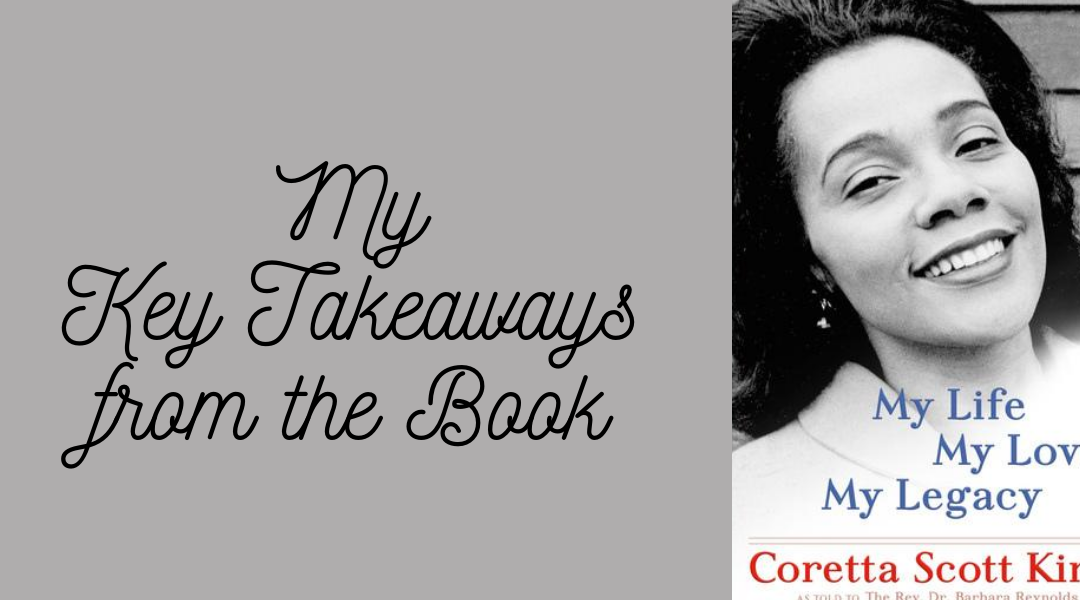One day in June 2018, I strolled into Barnes and Noble in search of a gift for a week old baby. My friend who took me to the store felt it was quite weird buying a newborn book. However, this was what I wanted to give this cutie. I selected the books I thought were nice for the boy and I as well got him a toy, and afterward I went in search of a personal companion I could leave the store with. On this hunt, I found a book from Martin Luther King Jr.’s wife, Coretta Scott King. I never read the book, not until February 2020.
I must confess this book was a great read. I will summarize my takeaways from this book in a few words below.
- Know that you (your friend or husband) have (has) a calling that is devoid of personal pleasure
Being a colored lady, Coretta King knew what racial inequality meant. She saw her father’s house and farm been burned down as a child in Alabama and she experienced racial prejudice why choosing a college. These experiences inspired her effort to promote social change and advocate social justice. This desire was born out of her calling; in the words of Coretta (as told by Barbara Reynolds) “I had a divine calling on my life, a charge, a challenge to serve not just the black people, but all oppressed humankind” (p. 3). In which her marriage to Martin Luther King allowed her to nurture a lifelong calling. This calling, ooo her husband never saw before he died. This was because Martin was a man who lived in the ideologies of the fifties that a woman must not work but manage the home.
Living this calling was paramount to her. As such, Coretta, who has a master’s degree in Music pushed herself to the forefront of advocacy by organizing “freedom concerts” to raise funds for the Southern Christian Leadership Congress (SCLC) rallies. As a woman conscious of her calling, after her husband’s death in 1968, as a widow and single mother, she pursued her calling while championing the cause of her husband. She then became well-known, not just as Martin Luther’s wife but as a lobbyist, civil rights activist, women/human’s right advocate, teacher, and fundraiser. After Martin Luther’s death in 1968, she founded the Martin Luther King Center in Atlanta. She also spearheaded the cause that made it a duty for America to celebrate Martin Luther King’s (MLK) day. Although, this demand was granted after several years of trials in 1986.
A narrative on calling in this book stood out for me. It helped me understand what purpose and calling means in marriage and relationship. This narrative came up when Coretta discussed the birth of Bernice, their youngest daughter. On the day Bernice was Martin Luther King Jr. had to go for a rally.
The very next day, however, Martin left for Birmingham. Five days later, protests began. Did I feel abandoned or neglected because of my husband’s quick departure after the birth of our daughter? The question has been raised before, but my answer is not complicated. For the most part, Martin and I shared values: I knew he loved his family, but we both had a higher calling and purpose that was much larger than the fulfillment of our own desires. As much as I loved Martin, I knew he belonged not just to me but to his calling. It had to be the first priority (p. 104-105).
Thus, beyond being friends or married to that person, there is a reason for your existence and the other’s existence. Ensure you engage with individuals who would allow you to fully do you and fulfill the calling and purpose of your existence.
- Commit your ways into God’s hand
All through the pages of the book, Coretta never ascribed any of the success she had as an advocate and single mother to herself, rather she knew there was a greater force, who is God. She identified prayer and faith as the source of her strength. She mentions, “throughout my life, whenever I didn’t pray, things went badly. I would become frustrated and feel out of sync with the will and purpose of God. But whenever my life was guided by prayer, I felt good about what I was doing, and I was able to reach other people with love and understanding” p.185.
I will conclude with this: “Coretta Scott King was a changemaker who knew her God and her calling and ensured she flourished therein.”


Wonderful review!